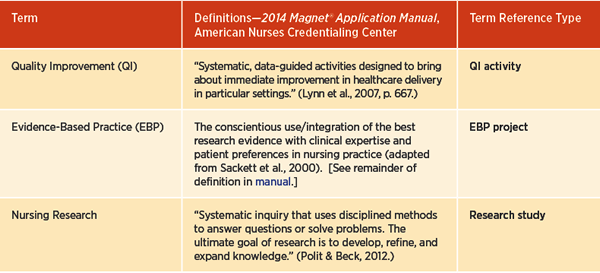Karen Gabel Speroni
PhD, MHSA, BSN, RN
Magnet®, Pathway to Excellence®
Dr. Karen Gabel Speroni helps hospitals and hospital systems through all phases of their nursing excellence journey, including Magnet®.
Dr. Karen Gabel Speroni helps hospitals and hospital systems through all phases of their nursing excellence journey, including Magnet®.
She is a research infrastructure and process expert who uniquely integrates organizational missions with research goals to facilitate evidence-informed practice of nursing, ultimately to advance the practice of nursing, including patient outcomes and work environment.
She has over 30 years of experience in biomedical research and hospital consultation, including hospital-based research, nursing excellence and evidence-based practice, as well serving on Institutional Review Boards, and university teaching.
Currently, Dr. Speroni:
- Serves as a consultant and educator with the American Nurses Association, for hospitals on their Magnet® and Pathway to Excellence® journey; Certificate Holder, Fundamentals of Magnet;
- Is adjunct faculty at Johns Hopkins School of nursing, serving as a Principal Investigator in multi-center, international research;
- Provides inquiry methods and research consultation to develop and sustain research programs for Magnet recognition for multiple health care systems and hospital, including Johns Hopkins;
- Presents research processes and research findings nationally and internationally, and
- Authors research / healthcare related publications.
Summary of Services
- Conducts organizational assessments.
- Reviews application documents for Magnet.
- Reviews ANCC requests for supplemental information and assists with responses.
- Prepares organizations for successful ANCC site visits working with hospital groups, shared governance councils, and clinical nurses.
- Assists with strategic planning for nursing excellence.
- Mentors and works with teams to successfully achieve strategic outcomes.
- Helps organizations develop effective shared leadership and decision-making structures, processes and outcomes, shared governance models and professional practice models.
- Research process expert.
- Utilizes iQuERY (Innovation, QUality improvement, Evidence-based practice, Research & You) to facilitate inquiry method best practices, a model which she innovated.
Education
- PhD, Business Administration-Health Care Management, Eastern University
- MHSA, Policy, Planning and Marketing, The George Washington University
- BSN, Research College of Nursing-Rockhurst University
Certifications
- American Nurses Credentialing Center–Certificate Holder in Fundamentals of Magnet®
Professional Memberships
- American Nurses Association
- Sigma Theta Tau International
- Virginia Nurses Association
Selected Recent Publications
1) Speroni, K.G., Antol, S., Lisle, L., Aroom, W. (2023). Differences by Nurse Type in Professional Quality of Life Perceptions from Pre-COVID-19 to Intra-COVID-19. OJIN: The Online Journal of Issues in Nursing Vol. 28, No. 3. DOI: 10.3912/OJIN.Vol28No03PPT75
2) Speroni, K.G. Remote Work in Nursing: Facilitators and Barriers. (2023). OJIN: The Online Journal of Issues in Nursing Vol. 28, No. 2, Manuscript 1, DOI: 10.3912/OJIN.Vol28No02Man01
3) Speroni, K.G. Letter to the Editor by Karen G. Speroni to OJIN topic: Professional Pathways in Nursing: Options to Seek, Start, and Sustain a Career. The Online Journal of Issues in Nursing. March 20, 2023. Retrieved from: Letter to the Editor by Karen G. Speroni to OJIN topic: “Professional Pathways in Nursing: Options to Seek, Start, and Sustain a Career” | OJIN: The Online Journal of Issues in Nursing (nursingworld.org)
4) Speroni, K.G., Budhathoki, C, Walters, C., Dutton, S., Mackay, P., Oguariri, R.M. (2022). Survey Research: Do all RN types have the same perceptions regarding professional nursing governance? Journal of Nursing Administration, 52(5) 258-265. 10.1097/NNA.0000000000001014
5) May, V, Knitting, J, Speroni, KG, Adil, M. Utilization of Emergent MRI in the Diagnosis of Acute Ischemic Stroke. (2022). Journal of Radiology Nursing.1-7. https://doi.org/10.1016/j.jradnu.2022.02.012
6) Hess, R., & Speroni, K.G. (2021). Onboarding best practices for professional nursing governance. Voice of Nursing Leadership, November: 4-6.
7) Speroni, K.G., & Hess, R. (2021). Pandemics challenges. Keeping nursing research alive. Journal of Nursing Administration, 51(7/8): 364-365.
8) Speroni, K.G., Wisner, K., Ober, M., Haines, F., Walters, C., & Budhathoki, C. (2021). Effect of Shared Governance on Nurse Sensitive Indicator and Satisfaction Outcomes by Magnet Recognition Status. Journal of Nursing Administration, 51 (7/8): 379-388. doi: 10.1097/NNA.0000000000001033
9) Speroni, K.G., Wisner, K., Stafford, A., Haines, F., AL-Ruzzieh, M.A., Walters, C., & Budhathoki, C. (2021). Effect of Shared Governance on Nurse Sensitive Indicator and Satisfaction Outcomes: An International Comparison. Journal of Nursing Administration, 51(5): 287-296. doi: 10.1097/NNA.0000000000001014
10) Lindauer, C., Speroni, K.G., Godinez, K., Lurz, T., Oakley, R., & Zakes, A. (2021). Effect of A Nurse-Led, Patient-Centered, Gratitude Intervention on Patient Hospitalization Experience. Journal of Nursing Administration. 51(4): 192-199. https://pubmed.ncbi.nlm.nih.gov/33734178/
11) Cusanza, S., Speroni, K., Curran, C., & Azizi, D. (2020). Effect of Individualized Learning Plans on Nurse Learning Outcomes and Risk Mitigation. Journal of Healthcare Risk Management. 40(4): 17-29. DOI: 10.1002/jhrm.21442
12) Hess, B., Weaver, S., & Speroni, K.G. (2020). Shared Governance During A Pandemic. Nurse Leader. doi: 10.1016/j.mnl.2020.05.008
13) Lisle, L., Speroni, K.G., Aroom, W., Crouch, L., & Honigsberg, H. (2020). Differences in Compassion Satisfaction, Compassion Fatigue and Work Environment Factors by Hospital Registered Nurse Types. Online Journal for Issues in Nursing; 25(3). DOI: 10.3912/OJIN.Vol25No03PPT44
14) Speroni, K.G. (2020). Call to Action for a US Nurse General: From Ebola to Corona. Journal of Nursing Administration, 50(5): E1-E2.
15) Speroni, K.G., McLaughlin, M., Friesen, M.A. (2020). Use of Evidence-based Practice Models and Research Findings in Magnet®-Designated Hospitals Across the United States: National Survey Results. Worldviews on Evidence-Based Nursing; 17(2): 98-10.
16) Baker, A., Speroni, K.G., Ruby, D., & Honigsberg, H. (2020). Health Care Professionals' Perceptions of Life-Sustaining Treatment Orders. Nursing2020; 50(2): 64-69.
For a listing of publications, click here
